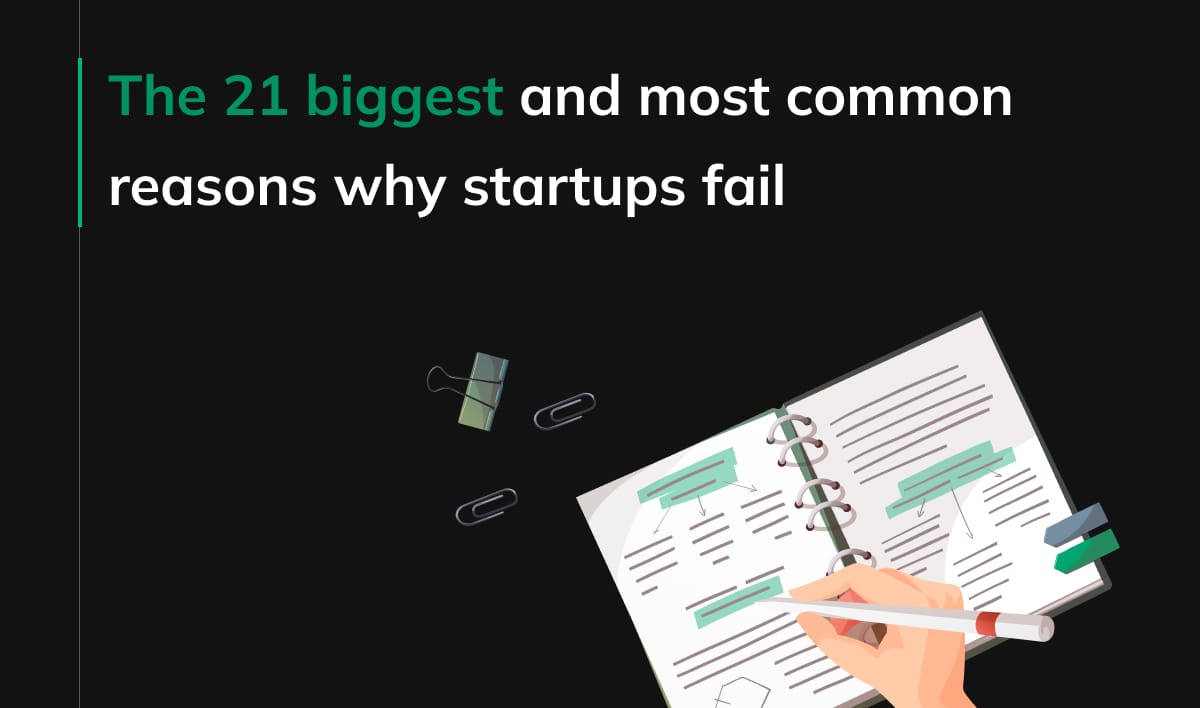The 21 biggest and most common reasons why startups fail

Great ideas, smart goals, gaining traction, real value, and failure. These are the most common words we hear in the tech startup industry. According to the data provided by the U.S. Bureau of Labor Statistics, 20% of new businesses fail during the first two years of operation, and more than 60% of all businesses don’t survive past the fifth year. Furthermore, those rates are even higher when you take only software startups into account.
When you are just starting out, it can be difficult to find what works and what doesn’t work. You can make many errors during this time period; however, there are some mistakes that will kill your startup faster than others. If you know which startup mistakes to avoid during startup, you may have a higher success rate. That is why we reached out to hundreds of small business owners, growth strategists, financial advisors, legal experts, and business consultants to compile the 21 biggest and most common mistakes that startups make so you can avoid them when starting your business. We hope this will help many new entrepreneurs in their startup journey.
1. Building a product nobody needs
“People don’t buy products. They buy better versions of themselves,” said startup expert Steve Blank. Many startup founders fall in love with their “imagined” product or service and believe that everyone else will want it; however, this isn’t always the case. Conducting customer research and analysing competition together with launching MVP is the inevitable path until you find a niche that supports it and there is demand for it. As an entrepreneur, you must meet customers first before you gain traction in business.
2. Forgetting about the MVP
Many startup founders wait until their startup product is perfect before testing the minimum viable product (MVP) with potential reference clients. A startup isn’t something you can perfect because, after a certain point, customers will start to expect things from you. If your startup fails on the first MVP launch, that’s okay if you’re willing to learn from your mistakes and improve your startup with each iteration. A startup is a process, and you need to go through each stage.
3. Missing the business plan
“Too many businesses start without a basic plan, and if you fail to plan, you are essentially planning to fail. A startup should map out a business plan, even if it is just one page. It should include how much it costs to operate, how much they anticipate selling, who would buy their product and why.” – Deacon Hayes, financial expert and founder of Well Kept Wallet. The bottom line here is that you should always have a plan or business model you want to test your great idea. It doesn’t mean it will automatically be a success.
4. Hiring too fast
Many startup founders want to hire even before their startup has officially launched to get things done quicker; however, this is often a terrible mistake. Your startup should only hire people when you need them instead of needing someone and hiring them just because you can afford it. This will not only lead to startup problems but startup costs as well. Successful entrepreneurs should stick to their plans and think rationally instead of spending money blindly.
5. Not focusing on the startup’s core competencies
This is another thing touching product and business plan. Each startup has its own unique qualities that set it apart from others; however, those startup qualities can vary greatly even within the same industry. For example, one startup might target a young demographic and provide convenience and speed, while another startup might target an older demographic and provide quality and affordability. That’s why it is vital for startup founders to identify their startup’s unique qualities so they can focus on developing their startup in ways that capitalise on those specific competencies.
6. Hiring startup employees that don’t share the startup’s vision or passion
Although startup founders might be passionate about their startup idea, they can’t expect everyone around them to share that same level of enthusiasm; however, if startup founders hire people who don’t care about the startup at all, it will lead to serious startup problems. If startup employees don’t care about a startup product or service, there is no chance that they will recommend it to others or promote it on social media, which means you are losing out on important startup growth opportunities
7. Not having a startup marketing plan
Since startup founders have limited startup capital, the only way to gain startup revenue is to market startup products or startup services to potential startup customers. This means you need a startup marketing plan. Many people think that the best startup marketing plan is based on referrals, but this isn’t always the case because many startup founders don’t have a large enough network to rely on referrals only. In order for startup founders to succeed, they should have startup marketing strategies in place. They also often overestimate their product and think that marketing is a small fraction of the total budget. Unfortunately, it is often the opposite. You need to spend at least 20% of the budget in the first years for paid promotion to get traction and attract more investors, VCs. This is how the most successful startup is built.
8. Focusing startup resources on startup liabilities instead of startup assets
You might have heard the term startup assets, but what about startup liabilities? Most people think that startup assets are anything related to their startup’s product or startup services, but they are wrong because many startup founders don’t realise that some of the most important startup assets are startup employees. Many startup founders think that startup employees are startup liabilities; however, startup employees can be powerful startup assets if you give them the special training they need to excel at their roles.
9. Not having a sufficient startup budget
You might be able to afford a startup lifestyle on startup capital, but is that really a startup idea worth pursuing? If your startup doesn’t have a sufficient startup budget for startup expenses, it is going to be really difficult to keep the startup up and running. This means you have two options: either scale down the startup until startup founders can afford startup costs or shut down the entire startup. Sometimes, when the budget is shrinking faster than expected, startup owners cut the marketing costs – which kills the user growth and brand recognition. You can’t cut startup costs – you need startup growth to reduce the startup costs.

10. The scaling trap
If your startup is focused on serving local startup customers, then it will be extremely difficult to scale up the startup. That’s because most startups grow exponentially after they reach a certain customer acquisition volume threshold. Once startup customers are not able to turn startup sales into startup revenue, startup founders need to find more customers. If startup customers are located close to startup headquarters, then this shouldn’t be a problem. However, if startup customers are far away from startup headquarters or local startup customers can’t generate sufficient startup revenue, you might want to consider expanding the startup’s startup customer base. If startup customers don’t expand startup revenue, startup founders need to start scaling down the startup and cut startup costs until the reduced startup budget can accommodate local startup customers.
11. Not filing for the proper legal structure and business registration
The biggest mistakes that startups make are not filing for the proper legal structure and not registering their startup with the proper startup registration agencies. If startup founders don’t file the proper startup corporate documentation, they are putting themselves at risk of personal liability if something goes wrong.
12. Doing everything yourself
A big mistake that entrepreneurs make is thinking they are all alone, and they try to operate independently without surrounding themselves with wise counsel. Don’t try to run a new business by yourself. Find and onboard trustworthy seasoned advisors to discuss your business ideas, strategy, challenges, and progress. Wisdom and power exist in the multiplicity of counsel. Incentivise four to six people to join your company as advisors in order to receive continuous feedback so that fewer mistakes will occur.” – James Zimbardi, chief executive officer, Rent Items
13. Partnering with the wrong investors
“An important piece of advice that entrepreneurs should know before starting a business is that their investors are more than just financial backers. A company’s first set of investors will make or break it. These individuals place their confidence in the business’s potential without having a proof of concept presented to them. Once businesses have undergone their seed funding, then they’ll interact with investors who look at the business’s growth and sustainability.” – Krish Subramanian, co-founder, and chief executive officer, of Chengebee
14. Setting the startup’s value at too low of a price
Setting startup valuation too low is another common startup mistake that startups make. To determine the startup’s startup valuation, startup founders need to estimate how much money they are going to raise in their seed round and what percentage of the startup will be sold. If you set your startup valuation too low, startup investors will think that your startup is not worth their money. If you set the startup valuation too high, startup investors will think that your startup is overvalued and they are going to have a hard time selling their stock when the startup goes public.
15. Misunderstanding the market and target audience
A common startup mistake is not taking the time to understand the market or customers you’re building for. For technical founders, writing code can seem easier than talking to customers, but there’s no way to know if you’re on the right track unless you’re constantly getting feedback from current or prospective customers. It’s important to recognise that building a great product often doesn’t translate into a successful business. Many companies find themselves focusing on a market that’s simply too small to build a big business in or are too competitive, or has a very low margin.
At Pragmatic Coders, we believe that appropriate planning, customer mapping, and customer experience are the key factors responsible for at least 50% of the success rate of every startup project we work with. That is why we have created two special workshops to help startup owners with this matter:
- Startup Consultancy Workshop (startup finance, monetisation, market potential, SWOT analysis)
- Product Design Workshop (market research, customer mapping, core features, customer surveys)
16. Sticking to startup mistakes instead of learning from them
Startup failure is inevitable, but startup success doesn’t have to be. If you are willing to learn from startup mistakes, your startup can quickly overcome startup failures and grow exponentially. For example, if you are launching the second startup idea this month, make sure you don’t make the same startup mistakes as you did with your startup idea last month. If you are already planning to launch the startup next month, then make sure you learn from startup mistakes made by startup founders who failed before you, so they don’t happen to startup founders after they launch their startups.
17. Not paying yourself an appropriate salary
Paying yourself too little or too much is a mistake, no matter your initial business plan. Determining the salary for a new recruit is frequently simpler than figuring out an owner or partner’s rate. Consider paying yourself a percentage of your income. Whatever you decide, make calculating your pay – and that of your partners – part of your routine and foundation to sound management expectations.
18. Lunching products or expanding too fast
It’s not uncommon for startup leaders to make the mistake of launching unfinished products or growing their startups too fast. Try launching a startup in one country and then expanding it into other countries once your startup becomes profitable. Once you have expanded your startup into at least five to ten markets, you can begin thinking about going global by starting a new branch in another country.
19. Focusing too much on fancy tools instead core business
Every time you start a company, you will be attacked by other B2B providers offering you hundreds of business software, services, training courses, etc. Instead of following “the trends”, you should focus the budget and attention on the product and go-to-market strategy (e.g. sales, marketing). Every startup owner should know the lean methodology, especially in the first years of activity.
20. Underestimating the general hardship of running a small business
The biggest mistake startup owners make is underestimating the demands of the business. Documentaries and blogs about startups are making people think optimistically; this is because the information available does not highlight the hardships of starting a business, but it glorifies the end, which is a thriving business. Because of this, people think that a startup is easy and fun when in reality, it is quite the opposite. Startups take most of your time and money. It can even ruin your family and health too. These are the risks to consider before rushing into the startup metaverse.
21. Developing too many startup ideas
A startup founder has hundreds of startup ideas, but they can only focus on one startup at a time. In order for startup founders to be successful, they need to know what startup idea is the right one for them and their startup. Each startup idea will have its own unique advantages and disadvantages, so it’s important for startup founders to fully research each potential startup in order to find the best startup idea for their startup.
The bottom line
Tech startups that succeed are built by a single individual – surround yourself with subject-matter experts and mentors who can help you learn from them. Although there are numerous startup blunders you want to avoid while developing your firm, inevitable mistakes are unavoidable, so be prepared for them.
Don’t be scared of failure; instead, learn from your failures and adapt your company model as needed. Experiment with new concepts and get feedback so you can improve your product to better satisfy consumer demands. The most successful businesses are built on failures.
Ready to start your project?
We hope that this article has helped you understand the major challenges regarding owning and running a typical software startup. It isn’t easy – but if you manage to succeed, the reward will be enormous in comparison to the risk.
At Pragmatic Coders, we specialise in helping startup projects in the whole journey – from ideation to the scaling phase. Here is the typical journey we conduct with our clients:
- Startup concept review and Startup Consulting
- Fundraising Consulting
- Product Design
- Software Development (MVP + iterations)
- Product development (new features, upgrades, scaling).
Our comprehensive Team includes not only software developers and project managers – but also business consultants and product designers that can change the whole game. All you have to do is to have your own product idea – we will take care of the rest.








